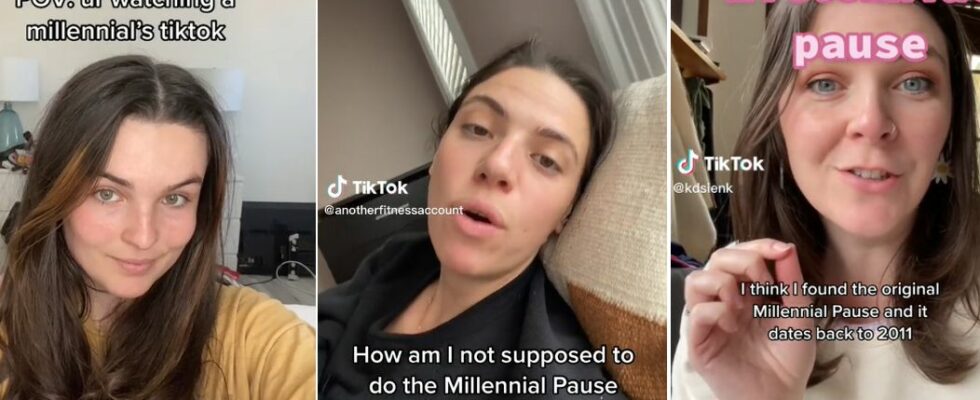A moment of breathing, a banal word dropped before really starting to speak, the eyes which escape towards the bottom of the screen to check that the recording has started: if you were born before 1997, there are chances are that this describes how you shoot a video of yourself.
A tic, a mania perhaps, innocent, but which greatly amuses people born in the early 2000s. The latter, who form the famous “Generation Z”, do not wait to speak once the recording is launched and have no problem shaking the phone – and therefore the image – the time to stabilize it somewhere.
On the short video platform TikTok, the term “millennial break”, referring to this literal little break between the start of recording and the moment you start talking, has gone viral. The hashtag #millenialpause counts some 23 million views.
The term comes from the tiktokeuse Nisa who, at the end of 2021, commented on a video of the singer Taylor Swift. The American singer, from the height of her 33 years, marked a few seconds of pause before expressing herself. A “detail” that Nisa, 25, did not fail to point out and, therefore, to conceptualize.
“Millennials” versus “Gen Z”, online, war is declared
That new generations make fun of their elders is not unheard of. What’s a little newer is that TikTok has become the favored ground for poking fun at the “embarrassing” habits of “millennials”, people born between 1981 and 1996.
With the explosion of TikTok and its new formats during the various confinements, these twenty-somethings and thirty-somethings have invaded the platform. They brought with them their own vision of showing themselves online. Dramatic zooms in on their faces to emphasize a word, expressions taken from the internet and used in “real life”, sometimes awkward pauses in photos, animal filters and “boomerang” videos… These digital uses differ radically from those of Generation Z.
There is indeed a generational relationship to the Internet and to our digital practices: this “millennial break” is the legacy of the use by twentysomethings and thirtysomethings of devices that sometimes took a few seconds to start recording. This generation knew the beginnings of the Internet, flip phones and the long hours spent on MySpace and MSN…
In the 2000s, devices equipped with cameras were not as developed, as fast or of such good quality (remember the pixelated photos on Skyblogs…). “Millennials were the first generation to grow up on the Internet, but also the first to grow old on it,” journalist Kate Lindsay wrote in The Atlantic.
Millennials have grown up in a digital space and world based mostly on text and images, but not really on video. Their discovery of digital was made on the side of forums, Tumblr, Myspace or Skyblog, from the beginnings of Facebook. Videos on YouTube, Vine, or Dailymotion have gained in quality over the years, but weren’t used as much as they are today. If this little technological twitch is invisible to those who do it, it becomes hilarious for the youngest and reflects the gradual change in technological practices and norms on a generational scale.
Disturbing Content
These little teasing between generations on TikTok can nevertheless leave a bitter taste to those who experienced the beginnings of the Internet and who have the feeling of no longer having their place there. Indeed, the content present on social networks acts as a mirror and reflects more young creators.
The codes of the “old Internet” that millennials continue to use, from boomerangs on Instagram to animal filters on Snapchat or a certain slicked-back aesthetic, are considered “awkward” for Generation Z of our teens and young adults; in the same way that we find seniors “embarrassing” on Facebook with their inspirational quotes and their proliferation of emojis and ellipsis…
Everyone is aging online, and our uses of technology leave visible marks on the way we move, talk, come together. “I don’t mean that we can’t use it anymore or that we don’t belong on it, but that the Web that we have built and used for the last fifteen years is no longer the Internet on which we are. However, millennials continue to use a lot of the markers, ways of acting and tics of the Internet from before, ”explained Kate Lindsay in the American newspaper The Atlantic.
Millennials are getting old when they see their iPod Nanos branded as “vintage” while “Gen Z” is moving away from the slicked-back aesthetic of Instagram’s early days for more “authentic” content, evidenced by the popularity of the BeReal application presented as “the anti-Instagram”. The Web and Internet culture is a huge cycle: everything comes back, is sucked in, digested and regurgitated in a new form by Internet users. But the generational gap is widening in this great technological wheel.

